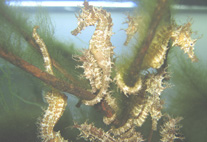Abstract
For many decades only two species of seahorses were recognized from Brazil: Hippocampus reidi Ginsburg, 1933, the long snout seahorse, and H. erectus Perry, 1810, the lined seahorse. The presence of a possible third species, recognized in 2002, brought about the need for a broad revision of the genus in Brazilian waters. A total of 335 specimens of seahorses, obtained from Brazilian and other collections, representing the three putative species from Brazil were analyzed: H. reidi, the species of greatest abundance and occurs in estuaries and the sea; H. erectus, which occurs only in the sea, and Hippocampus patagonicus was also determined to be present based on multiple specimens. Our morphometric / numerical and molecular analysis showed that the species currently identified as H. erectus in Brazil is actually H. patagonicus Piacentino & Luzatto, 2004. The existence of a possible third species, was instead based on the true H. erectus, as confirmed in the present study by the study of classical systematic and mitochondrial analysis. Thus, we recognize three species of seahorses in Brazil: H. erectus, H. reidi and H. patagonicus.

